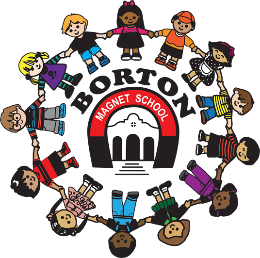Parent Involvement
Parent Involvement Policy
I. Statement of Purpose
Borton Magnet School seeks to create a community of learners through an integrated, authentic and relevant curriculum. Providing opportunities to construct meaning through actual experiences, student instruction at Borton is focused on learning how to learn. Our school’s mission is to provide a secure and culturally sensitive environment which nurtures the social, emotional, physical, aesthetic and intellectual needs of children through developmentally appropriate practices.
II. Annual Meeting
At the beginning of each school year, the school staff, parents and families will meet to share the Title I Budget and Program information of the present year. Parents and families have the right to be involved as learners, teachers, decision-makers, supporters and advocates for their children.
III. Parent Involvement Program
Parent involvement supports the academic success of every student. A collaborative partnership between Borton and our parents fosters educational support for students and parents. In building capacity to ensure the effective involvement of parents, we are implementing the research-based program of Dr. Joyce Epstein and the following six types of Parent Involvement, including activities that foster meaningful involvement in each area. Meetings will be offered at flexible times and childcare will be provided as needed. The school will also provide translation services as needed.
Type I: Parenting:
Goal- Assist families with parenting and child rearing skills, understanding adolescent development, and setting home conditions that support children as students at each age and grade level. Assist schools in understanding families.
Activities: Family Parenting Sessions; Love and Logic, Health and Wellness; Home visits; Adult Education Classes- English/Spanish Conversations; Extended Library Hours with Parent ability to check out books to read with their children; Library Frequent Reader Program and District Parent Learning Opportunities.
Type II: Communicating:
Goal- Communicate with families about school programs and student progress through effective school to home and home to school communications.
Activities: Parent/ Teacher Conferences; Parent Compacts; Surveys; Language Interpretations and Translations; Student Homework Folders & Classroom Newsletters sent home weekly; Regular schedule of notices; Monthly Newsletters; and the maintenance of a current website that communicates events, meeting minutes, and school information.
Type III: Volunteering:
Goal- Improve recruitment, training, work and schedules to involve families as volunteers and audiences at the school or in other locations to support students and school programs.
Activities: Parent/ Volunteer Coordinator; Volunteer Survey; Recognition Event; PTA-sponsored events including Open House, Movie Night, Heritage Feast, Cinco de Mayo, Borton Environmental Learning Lab Discovery Day, Family Work Day, Jump-a-thon.
Type IV: Learning At Home:
Goal- Involve families with their children in learning activities at home, including homework and other curriculum-related activities and decisions.
Activities: Parent Conferences; Family Celebrations of Learning.
Type V: Decision Making:
Goal- Include families as participants in school decisions, governance, and advocacy through Site Council, PTA, committees and community forums.
Activities: Recruit, train and support representation by parents in the School Site Council; Interview Team; School and Community Partnership Council (SCPC); and Parent/ Teacher Association (PTA).
Type VI: Collaborating With the Community:
Goal- Coordinate community resources and services for students, families and the school with businesses, agencies, and other groups, and provide services to the community.
Resources: Oasis Volunteer Program; Community Garden Program; Literacy for Life Coalition Participation.
IV. Student/Parent/Teacher Compact
We will use a Student/Parent/Teacher Compact that will be signed by each Title I child’s teacher and his/her parents at the Parent-Teacher Conference. Parents will share the responsibility with the school for high student academic achievement in the following ways:
- See to it that child is rested, well-nourished, clean, and appropriately dressed.
- See that child attends school daily and arrives on time for pledge.
- Support child by planning a regular time and place for child to do homework.
- Review child’s homework for completion and quality.
- Read with child in the language parent reads and let child see parent read.
- Help child solve problems peacefully.
- Support the school rules and discipline procedures.
- Understand the goals and learning objectives for which child is responsible.
- Communicate with and support child’s teacher.
V. Documentation and Assessment
Ongoing assessment and evaluation of parent involvement will be essential to the success of our Parent Involvement Program. Major indicators of progress will include the following practices:
- Community Representative will be responsible for maintaining documentation of all parent/family events in a Parent Involvement Portfolio.
- Documentation of all volunteer hours.
- Documentation of parent attendance for all meetings.
- Parent evaluations of all workshops
- Minutes of Monthly School Council Meetings will reflect Collaboration with the Community.
- Annual evaluation of the Parent Involvement Policy, documented by data collection forms and parent signatures.

